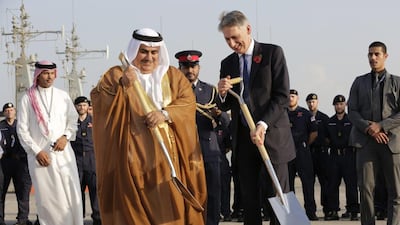Yesterday’s visit to Bahrain by Prince Andrew to mark the official launch of the Royal Navy’s operations from its new base at HMS Juffair marks an important sea-change in the British government’s attitude towards the security of the Gulf.
Ever since 1971 when Britain, for reasons of economy, took the strategic decision to withdraw its military forces from east of Suez, successive British governments have had to fend off accusations that they are not serious about protecting the interests of their Gulf allies.
Britain has, it is true, continued to contribute to military operations in the region, with the Royal Navy, Army and Royal Air Force all making major deployments in support of a variety of military operations. This ranges from protecting the Strait of Hormuz during the eight-year Iran-Iraq war during the 1980s to, more recently, the campaign to defeat ISIL.
But the absence of a permanent base has, on occasion, raised doubts in the minds of many Gulf leaders about the strength of Britain’s long-term commitment to the region’s security. Concerned that they could no longer rely on London to protect their interests, there has, in recent years, been a tendency to turn towards other western allies such as the US and France.
Such concerns, however, need to be revised in the wake of Britain’s decision to establish its new Royal Navy base in Bahrain – the senior service’s largest operational base outside the UK.
The navy’s new facility at HMS Juffair reclaims ownership of a base Britain enjoyed for decades before handing it over to the US Navy’s fifth fleet as part of the east of Suez withdrawal.
While small by comparison to the massive American naval presence, the Royal Navy's return to Bahrain nonetheless demonstrates that Britain is serious about developing a new era of practical cooperation in its relations with its Gulf allies.
___________________________
Read more from Opinion:
Shelina Janmohamed: Beauty is in the eye of the social media user – but it shouldn't be
___________________________
Nor is the restoration of the navy's ties with Bahrain the limit of Britain's military involvement with the region. British forces are playing a key role in training and mentoring Gulf forces, especially in the Emirates where they have been deeply involved in the campaign to defeat Iranian-backed rebels in Yemen.
The RAF, meanwhile, has a squadron of state-of-the-art Eurofighters on almost permanent standby at the Emirates’ Al Minhad airbase to defend and protect the region’s air space.
The Royal Navy’s return to Bahrain, though, is of particular historical significance for Britain, as it helps to consolidate a relationship that dates back more than 200 years.
The ties between London and Manama date back to the early 19th century when, in the era prior to the construction of the Suez Canal, Britain needed a permanent base in the region to tackle pirates who regularly attacked the trade routes then operated by the East India Company between India and Britain.
The Royal Navy struck a formal agreement with the ruling Al Khalifa family in 1835 to tackle piracy and the slave trade, which allowed Britain to establish its own base at the Mina Salman port.
British forces continued to operate from the facility until 1971, when the entire 10-acre facility was taken over by the US.
Now the re-establishment of the British base suggests that, with the Brexit process due to commence in earnest next year, Britain is seeking a deeper strategic relationship with its allies not just in Bahrain but with the wider Gulf region.
The Royal Navy is already providing an important contribution to Gulf security in the form of the fleet of minesweepers it has on permanent deployment in the region to prevent hostile regimes like Iran from disrupting vital shipping routes by placing mines in the Strait of Hormuz.
In addition, the Navy normally has a frigate or destroyer on patrol in support of the US-led protection operation. Britain’s contribution to Gulf security will be further enhanced by the deployment of one of the two new 65,000-tonne Queen Elizabeth-class aircraft carriers, the first of which is due to enter operational service at the start of the next decade.
Lt Gen Sir Simon Mayall, Britain’s former special advisor to the Middle East who helped negotiate the opening of the new naval base, told me that he believed Britain’s return east of Suez was a watershed moment in the future development of relations between Britain and the Gulf.
“The fact that we now have a permanent base in the region should allay the fears of our Gulf allies that Britain is serious about safeguarding their security,” said Sir Simon. “Britain has been in the Gulf on an ad hoc basis for the past 40 years. Now we have demonstrated we are here to stay.”
The strengthening of Britain's military ties with the region, moreover, could prove timely, given the approach the Trump administration is likely to take in its dealings with Iran.
The appointment of John Bolton, who starts his new job as National Security Advisor next week, indicates Washington will be taking a far more robust attitude in its dealings with Iran and in particular, the constant attempts by the Iran Revolutionary Guard Corps to destabilise the Gulf states.
And if that happens, having the British military available in support of its American and Gulf allies would be a great help, especially when it comes to making sure the vital shipping lanes of the Gulf are kept open for business.
Con Coughlin is the Daily Telegraph’s defence and foreign affairs editor


